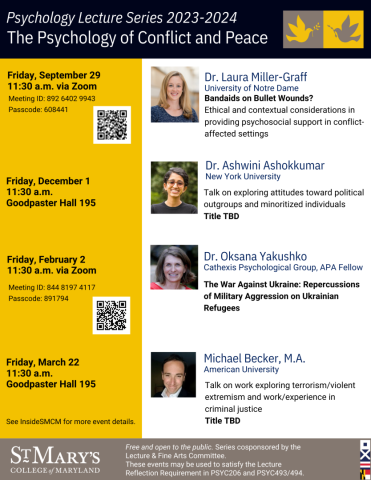
The psychology department welcomes you to join us for this year's lecture series which will explore will explore various elements of the Psychology of Conflict and Peace by inviting four social scientists who study conflict and resolutions from varied disciplinary perspectives such as social psychology (e.g., interpersonal conflict, intergroup apologies), developmental psychology (e.g., child development and resilience in war), clinical/counseling psychology (e.g., PTSD and treatment of mental distress among refugees), and/or cognitive psychology (e.g., decision making and support for political violence).Two of the four speakers will give virtual lectures.
Friday, September 29 @ 11:30 am - 12:30 pm; via Zoom (Meeting ID: 892 6402 9943, passcode: 608441)
Dr. Laura Miller-Graff (University of Notre Dame) will present "Bandaids on Bullet wounds? Ethical and contextual considerations in providing psychosocial support in conflict-affected settings." Providing mental health and psychosocial support (MHPSS) in conflict-affected settings has gained substantial support in the past decade, and represents an important step in foregrounding the serious psychological toll of conflict and violence on individuals, families, and communities. A number of scholars and practitioners, however, have raised important ethical and contextual considerations for MHPSS including what it means to provide care in contexts where violence is ongoing, and the extent to which the provision of care may turn attention away from addressing and preventing violence -- a root cause of distress. Concerns have also been raised about the "export" of psychological practices from the global West with little to no consideration of cultural and contextual adaptation. Enlivened by real-world examples of MHPSS research and programs for children and families, this talk will address the evidence-basis for MHPSS in conflict-affected settings as well as ethical quandaries encountered by researchers and practitioners and possible ways forward. We will discuss questions regarding the contextual and cultural adaptation of MHPSS programs and next steps in the movement towards providing ethical, equitable and dignified care for individuals and families whose lives are affected by violence.
Friday, December 1 @ 11:30 am – 12:30 pm; Goodpaster Hall 195
Dr. Ashwini Ashokkumar (New York University) will speak on “The Psychological Roots of Digital Echo Chambers: Understanding Political Polarization in the Digital Age.” There has been growing concern about the role that digital echo chambers play in political polarization. In her talk, combining findings from two projects, Dr. Ashokkumar will explore two possible psychological mechanisms through which echo chambers are formed and sustained. In the first part of the talk, she will describe findings from an analysis of the language of 270,000+ members of Reddit communities of supporters of the 2016 Presidential candidates--Donald Trump and Hillary Clinton. In the second part of the talk, she will describe findings from a series of experiments that examined censoring of belief-opposing content. Together, the studies highlight new pathways through which online contexts become homogenous and averse to disagreement. Ashokkumar will conclude by discussing implications of the findings for democracy.
Friday, February 2 @ 11:30 am – 12:30 pm; Via Zoom (Meeting ID: 844 8197 4117, Passcode: 891794)
Dr. Oksana Yakushko (Co-founder of the Cathexis Psychological Group; APA Fellow) will present on "The War Against Ukraine: Repercussions of Military Aggression on Ukrainian Refugees." Russia's war against Ukraine, especially since the armed invasion of 2022, resulted in an unprecedented number of Ukrainian refugees worldwide. Nearly 20 million people in a country of less than 40 million fled war violence, both across the borders and internally. Moreover, since most Ukrainian refugees consider themselves temporary refugees, and many have returned to Ukraine even as it still experiences significant military violence. In this presentation, historical, cultural and social background of Ukraine will be discussed in relation to both refugee struggles (e.g., colonization, multigenerational traumas, genocides) as well as their resistance (i.e., long-term fight for independence, freedom, self-determination). Implications of this war and the refugee experience to understanding mental health, psycho-social and cultural considerations of refugee experience globally will also be discussed.
Friday, March 22 @ 11:30 am – 12:30 pm; Goodpaster Hall 195
Michael Becker, M.A. (American University) will speak on "Summoning the Mob: Why People Support Political Violence." Why do people support the use of political violence? Becker argues that politically salient stress is fundamental to understanding these attitudes, but research is unclear as to how, why, and when. As recent polls show a rising threat of political violence, a more comprehensive understanding of the issue is essential. Integrating psychological and criminological theories, this talk will focus on politically salient stress as an interdisciplinary model that can help explain the emergence of support for political violence and suggest actionable solutions. Specifically, this talk will highlight the role of political elites and salient narratives in increasing support for political violence using data scraped from a far-right community web forum in the period leading into the January 6, 2021 attack on the U.S. Capitol.
Series co-sponsored by the Lecture and Fine Arts Committee. All lectures free and open to the public.
These events may be used to satisfy the Lecture Reflection Requirement in PSYC206 and PSYC493/494
